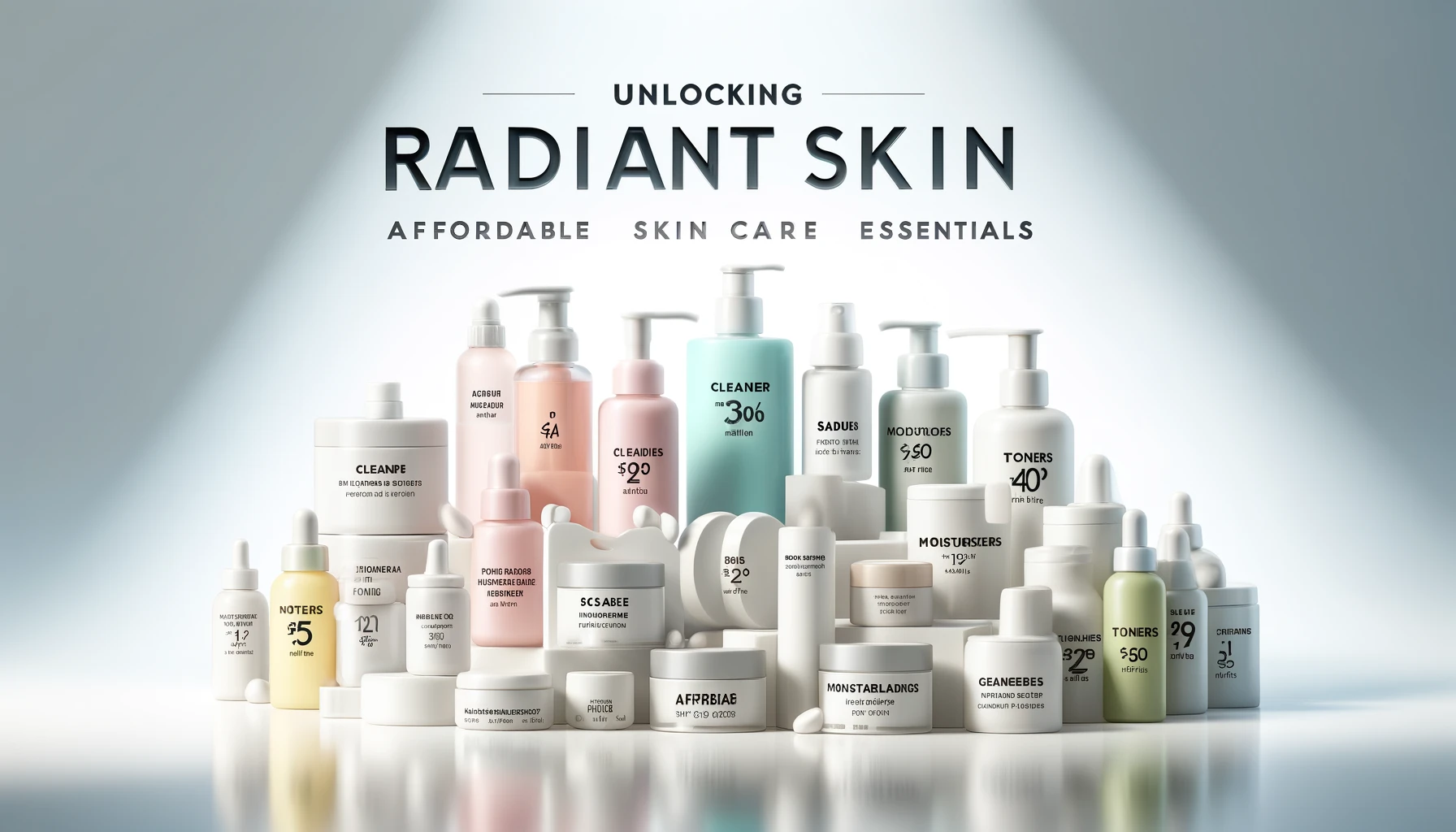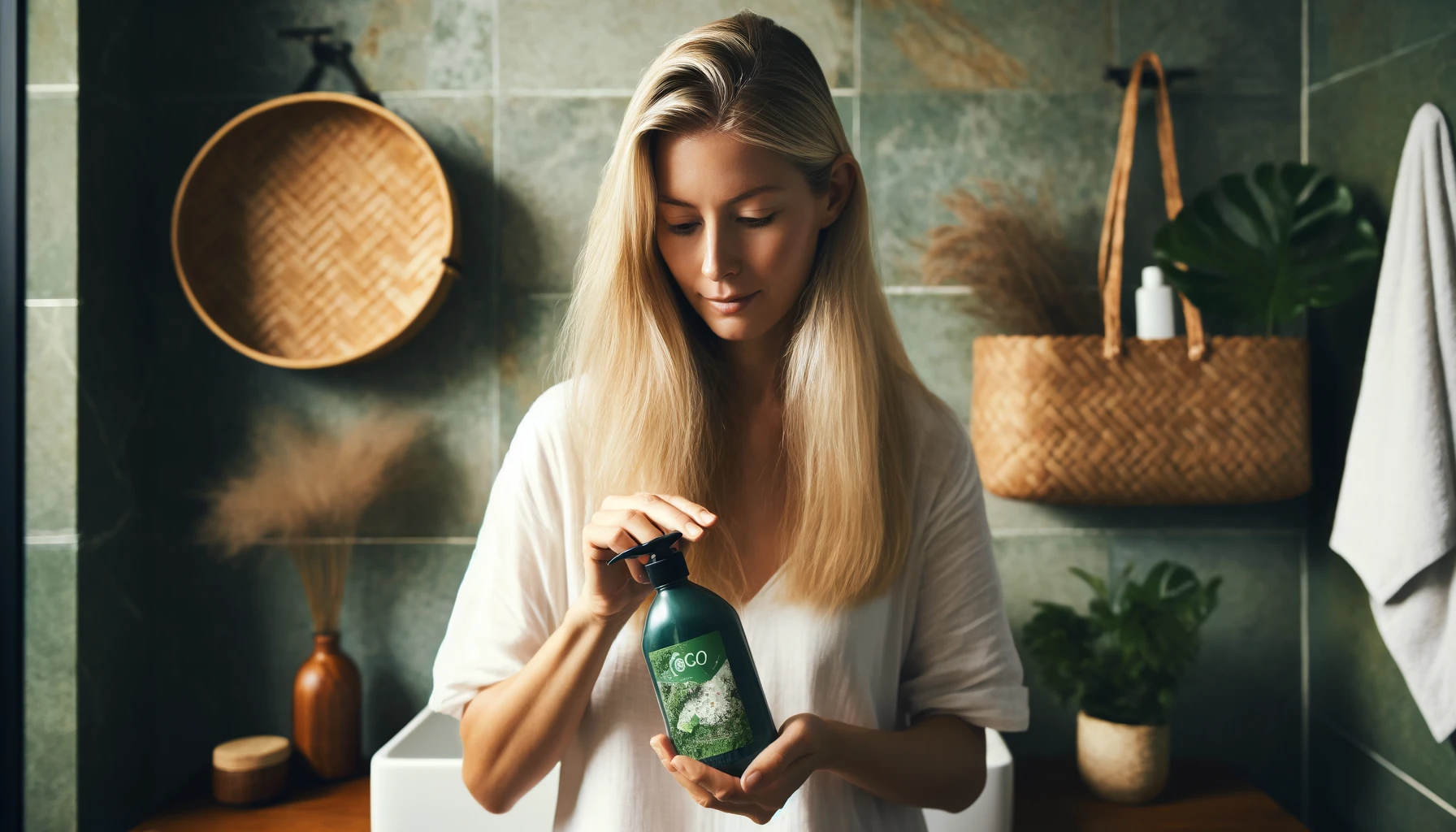
Unlocking Radiant Skin: Affordable Skincare Essentials
Importance of a Skincare Routine
Having radiant and healthy skin is a universal desire. A consistent skincare routine is essential to achieve this goal as it helps maintain skin health, prevent common skin issues, and promote a youthful appearance.
Our skin is constantly exposed to environmental factors such as pollution, UV rays, and harsh weather conditions. These external stressors can lead to a variety of skin problems, including dryness, dullness, acne, and premature aging. A well-rounded skincare routine can effectively combat these issues and give you the glowing complexion you desire.
By following a regular skincare routine, you can establish good habits that promote the overall health and well-being of your skin. Just like we brush our teeth daily to maintain oral hygiene, taking care of our skin should be a non-negotiable part of our daily routine.
Not only does a skincare routine address existing skin concerns, but it also serves as a preventive measure against future problems. By consistently using skincare products that are suitable for your skin type and concerns, you can maintain a clean and healthy canvas for your skin to flourish.
Additionally, a proper skincare routine can help slow down the aging process and promote a youthful appearance. As we age, our skin loses its natural elasticity and collagen, leading to wrinkles, fine lines, and sagging. However, with the right products and ingredients, we can nourish and support our skin’s natural rejuvenation process, allowing us to maintain a more youthful and radiant complexion for longer.
Implementing an effective skincare routine doesn’t have to be costly. In fact, this article aims to provide a 7-point plan for affordable skincare essentials, enabling readers to unlock radiant skin without breaking the bank. With a combination of proper cleansing, exfoliation, moisturization, sun protection, and targeted treatments, you can establish a budget-friendly skincare routine tailored to your unique needs.
Remember, consistency is key in skincare. By committing to a regular skincare routine and being patient with the results, you can enjoy the journey towards healthier and more radiant skin.
The Importance of Identifying Your Skin Type and Concerns
Before investing in skincare products, it is crucial to understand your specific skin type and concerns. This knowledge will guide you in selecting the right products and ingredients that meet your needs. Identifying your skin type helps determine how your skin reacts to various environmental factors and products, allowing for a customized skincare routine that ensures optimal results.
Determine your skin type: There are four main skin types: dry, oily, combination, and sensitive. Dry skin can feel tight and rough, while oily skin tends to be shiny and prone to breakouts. Combination skin involves a mix of dry and oily areas, while sensitive skin is easily irritated and reacts to certain products or ingredients. Observe how your skin looks and feels to identify which category it falls into.
Understand your skincare concerns: In addition to determining your skin type, it is essential to address any specific concerns you may have. Common skincare concerns include acne, aging, pigmentation, and dehydration. Acne-prone skin requires products that control oil and treat breakouts, while anti-aging concerns may require ingredients that promote collagen production and reduce fine lines. Understanding your concerns allows you to select products that target and improve these areas effectively.
Research ingredients: Once you know your skin type and concerns, research the ingredients that are beneficial for addressing those specific issues. For example, if you have oily skin and acne concerns, look for ingredients like salicylic acid or tea tree oil that help control oil production and fight acne-causing bacteria. If you have dry skin and aging concerns, ingredients like hyaluronic acid or peptides can provide hydration and reduce the appearance of fine lines. Understanding the effects of different ingredients will help you make informed choices when selecting skincare products.
Seek professional advice if necessary: If you are unsure about your skin type or have persistent skincare concerns, it may be beneficial to seek professional advice from a dermatologist or skincare specialist. They can assess your skin, provide personalized recommendations, and suggest specific products or treatments tailored to your unique needs. Professional advice can help you establish a solid foundation for your skincare routine.
By identifying your skin type and concerns, you can make informed decisions about the skincare products and ingredients that are suitable for you. This knowledge allows you to create a personalized skincare routine that addresses your specific needs, helping you achieve healthier and more radiant skin.
Cleansing: The Foundation of a Skincare Routine
Proper cleansing is the first and most crucial step in any effective skincare routine. It sets the foundation for healthy, radiant skin by removing dirt, excess oil, and impurities accumulated throughout the day.
Here are some key points to consider when it comes to cleansing:
Know Your Skin Type
Understanding your skin type is essential for choosing the right cleanser. Whether you have dry, oily, combination, or sensitive skin, there are specific cleansers formulated to cater to each type’s unique needs.
For dry skin, opt for a gentle, hydrating cleanser that nourishes the skin without stripping away its natural oils. Look for ingredients like hyaluronic acid or ceramides, which help retain moisture.
If you have oily or acne-prone skin, go for a cleanser that is specifically designed to control excess oil production and unclog pores. Ingredients like salicylic acid are known for their ability to prevent breakouts and keep the skin clear.
Those with sensitive skin should look for fragrance-free and hypoallergenic cleansers that are gentle and non-irritating.
Choose an Affordable Cleanser
Affordability doesn’t mean compromising quality when it comes to cleansers. There are plenty of budget-friendly options available that offer excellent results.
Look for drugstore brands or affordable skincare lines that provide cleansers tailored to different skin types. You don’t always have to splurge on high-end products to achieve clean and healthy skin.
The Cleansing Routine
Develop a consistent cleansing routine by washing your face twice a day – once in the morning and once in the evening.
Start by wetting your face with lukewarm water. Then, apply a small amount of your chosen cleanser onto your fingertips or a cleansing brush. Gently massage the cleanser onto your skin in circular motions, paying extra attention to areas prone to oiliness or impurities.
Rinse off the cleanser with lukewarm water and pat your skin dry with a clean towel. Avoid rubbing your face vigorously, as it can cause irritation and damage the skin.
Additional Tips
Here are a few extra tips to enhance your cleansing routine:
- If you wear makeup, consider using a separate makeup remover before cleansing to ensure all traces of makeup are removed.
- For a deeper cleanse, incorporate a gentle exfoliator into your routine once or twice a week. This helps remove dead skin cells and promotes a smoother complexion.
- Avoid using hot water for cleansing, as it can strip the skin of its natural oils and cause dryness. Stick to lukewarm water instead.
In conclusion, a proper cleansing step is the foundation of a successful skincare routine. By understanding your skin type, choosing an affordable cleanser suitable for your needs, and following a consistent cleansing routine, you can maintain a clean and healthy canvas for the rest of your skincare journey.
Remember to always listen to your skin and adjust your cleansing routine accordingly. With patience and consistency, you can achieve radiant and healthy skin without breaking the bank.
Exfoliation: Revealing Fresher and Radiant Skin
Exfoliation is a crucial step in any skincare routine as it helps slough away dead skin cells, revealing newer and fresher skin underneath. This process not only promotes a radiant complexion but also helps with cell turnover and improving the overall texture of the skin.
Why is exfoliation important?
- Removes dead skin cells: Exfoliating helps to eliminate the build-up of dead skin cells on the surface, which can make the skin appear dull and lackluster.
- Improves skin texture: Regular exfoliation smoothes the skin’s surface, leaving it softer and more refined.
- Enhances product absorption: By removing the layer of dead skin cells, exfoliation allows for better absorption of skincare products, maximizing their effectiveness.
Choosing the right exfoliator:
Selecting an affordable exfoliator suited to your skin type and concerns is essential. Look for products that contain alpha-hydroxy acids (AHAs) or beta-hydroxy acids (BHAs). These ingredients gently dissolve dead skin cells without causing irritation.
| AHAs | BHAs |
|---|---|
| Glycolic acid | Salicylic acid |
| Lactic acid | Betaine salicylate |
| Mandelic acid | Willow bark extract |
How often to exfoliate:
Exfoliation frequency depends on your skin’s tolerance. It is generally recommended to exfoliate once or twice a week. However, if you have sensitive skin, start with less frequent exfoliation to avoid over-exfoliation, which can cause redness and irritation.
Application instructions:
- Start with clean, dry skin.
- Apply a small amount of exfoliator to your fingertips or a cleansing brush.
- Gently massage the exfoliator onto your face in circular motions, avoiding the delicate eye area.
- Rinse thoroughly with lukewarm water and pat dry with a clean towel.
- Follow up with a moisturizer to replenish hydration and maintain the skin’s barrier function.
Remember, consistency and patience are key when incorporating exfoliation into your skincare routine. Over time, you will notice your skin becoming smoother, brighter, and more radiant.
Moisturization: Keep Your Skin Hydrated and Supple
Regardless of your skin type, moisturizing is an essential step in any skincare routine. It helps to maintain the skin’s natural moisture balance, keeping it hydrated and supple. By choosing the right moisturizer for your specific needs and concerns, you can achieve healthy and radiant skin. Follow these tips to ensure proper moisturization:
Identify your skin type and concerns
Before selecting a moisturizer, it is essential to understand your skin type and concerns. This will help you choose a product specifically formulated for your needs. Dry skin requires a richer and more nourishing moisturizer, while oily skin benefits from lightweight and oil-free options. Combination skin can benefit from a moisturizer that balances hydration without clogging pores.
Look for key ingredients
When choosing a budget-friendly moisturizer, pay attention to the key ingredients. Hyaluronic acid, glycerin, and ceramides are excellent choices as they help to lock in moisture and provide long-lasting hydration. These ingredients also contribute to improving the skin’s natural barrier function, preventing moisture loss and promoting a plump appearance.
Incorporate moisturizer into your daily routine
Consistency is key when it comes to moisturizing. Make it a part of your daily skincare routine by applying moisturizer twice a day, after cleansing and exfoliating. This ensures that your skin stays hydrated throughout the day and night. Remember to use gentle, upward motions when applying the moisturizer to avoid tugging or pulling on the skin.
Customize for specific concerns
If you have specific skin concerns such as aging, acne, or pigmentation, consider using a moisturizer that addresses these issues. Look for products that contain ingredients like retinol for anti-aging benefits, niacinamide for brightening and overall skin improvement, or salicylic acid for acne-prone skin. Remember to introduce these targeted treatments gradually into your routine to avoid any potential irritation.
Don’t forget sun protection
Even though we mentioned sun protection as a separate point, it is crucial to reiterate its importance when it comes to moisturization. Look for moisturizers that offer SPF protection, ideally with a minimum SPF of 30. This ensures that your skin is shielded from harmful UV rays, preventing premature aging and other sun damage. Apply sunscreen generously to all exposed areas of your skin and remember to reapply throughout the day, especially if you’re spending time outdoors.
By following these tips, you can select an affordable moisturizer that caters to your unique needs. Consistent moisturization will keep your skin hydrated, supple, and on its way to achieving that radiant and healthy glow you desire.
Sun protection: Protecting your skin from harmful UV rays
Protecting your skin from the damaging effects of the sun’s UV rays is crucial for maintaining a healthy and youthful complexion. Sun exposure can lead to premature aging, pigmentation, and other skin issues. By incorporating sun protection into your daily skincare routine, you can safeguard your skin and prevent these problems.
Why is sun protection important?
Sun protection is essential for everyone, regardless of their skin tone or the current weather conditions. The sun’s UV rays can penetrate the clouds and cause damage to the skin, even on cloudy days. Here are some key reasons why sun protection should be a priority in your skincare routine:
- Prevent premature aging: Prolonged exposure to the sun’s rays can lead to the development of fine lines, wrinkles, and sagging skin. Sun damage accelerates the aging process, making the skin appear older than it is. Applying sunscreen daily helps minimize these signs of aging and keeps your skin looking youthful.
- Protect against pigmentation: Sun exposure can trigger an increase in melanin production, leading to the development of dark spots and uneven skin tone. Regular use of sunscreen helps prevent and fade hyperpigmentation, keeping your complexion bright and even.
- Reduce the risk of skin cancer: UV radiation is a known carcinogen and one of the primary causes of skin cancer. By applying sunscreen with a minimum SPF (Sun Protection Factor) of 30, you can significantly reduce the risk of developing skin cancer.
Choosing the right sunscreen
When selecting a sunscreen, it’s important to consider a few key factors:
- SPF: Look for a sunscreen with a minimum SPF of 30. This level of protection is sufficient for everyday use and provides effective coverage against both UVA and UVB rays.
- Broad-spectrum: Ensure that the sunscreen is labeled as “broad-spectrum,” as this indicates that it offers protection against both UVA and UVB rays. UVA rays contribute to premature aging, while UVB rays are responsible for sunburn.
- Ingredients: Look for sunscreens that contain ingredients like zinc oxide or titanium dioxide, which provide physical protection by reflecting and scattering the sun’s rays. These ingredients are less likely to cause skin irritation and are suitable for sensitive skin.
Application and reapplication
Proper application and regular reapplication of sunscreen are essential to ensure maximum protection:
- Apply generously: Use enough sunscreen to cover all exposed areas of your skin. Be sure to apply it evenly and don’t forget commonly overlooked areas, such as the ears, neck, and the back of your hands.
- Reapply frequently: Sunscreen should be reapplied every two hours, or more often if you’re swimming or sweating heavily. Even water-resistant sunscreens lose their effectiveness over time, so it’s important to reapply regularly.
Incorporating sun protection into your skincare routine doesn’t have to be expensive. There are budget-friendly sunscreen options available that provide the necessary protection without breaking the bank. Remember, consistency in applying and reapplying sunscreen is key to keeping your skin healthy and protected.
For more information on sun protection and its importance, you can visit reputable sources such as the Skin Cancer Foundation or the American Academy of Dermatology.
By prioritizing sun protection and following these guidelines, you can safeguard your skin from harmful UV rays and maintain a radiant and healthy complexion.
Targeted Treatments
If you have specific skin concerns like acne, fine lines, or hyperpigmentation, incorporating targeted treatments into your routine can address these issues effectively.
One effective ingredient to look for in affordable skincare products is retinol. Retinol is a derivative of vitamin A and is known for its anti-aging properties. It helps stimulate collagen production, reduce the appearance of wrinkles, and improve skin texture. According to a study published in the Journal of Cosmetic Dermatology, retinol has been shown to reduce the signs of aging and improve overall skin quality.
If you’re dealing with hyperpigmentation or dark spots, consider incorporating a vitamin C serum into your routine. Vitamin C is a powerful antioxidant that can help brighten the skin and fade discoloration. Research published in the Journal of Clinical and Aesthetic Dermatology has found that topical application of vitamin C can effectively treat hyperpigmentation.
Niacinamide is another beneficial ingredient to look for in affordable skincare treatments. It helps regulate oil production, improve uneven skin tone, and strengthen the skin barrier. A study published in the International Journal of Molecular Sciences supports the effectiveness of niacinamide in improving the skin’s barrier function and reducing hyperpigmentation.
If you struggle with acne-prone skin, consider incorporating products with salicylic acid into your routine. Salicylic acid is a beta-hydroxy acid that helps exfoliate the skin, unclog pores, and reduce acne breakouts. According to research published in the Journal of Clinical and Aesthetic Dermatology, salicylic acid is effective in treating acne and preventing future breakouts.
When introducing targeted treatments into your routine, it’s important to perform a patch test first to check for any sensitivity or allergic reactions. Additionally, start by using the treatment products once or twice a week and gradually increase frequency if your skin tolerates it well.
Remember to be patient and consistent with your skincare routine. It takes time for these treatments to show their full effects, so don’t expect instant results. Enjoy the process and watch as your skin transforms and becomes healthier and more radiant.


